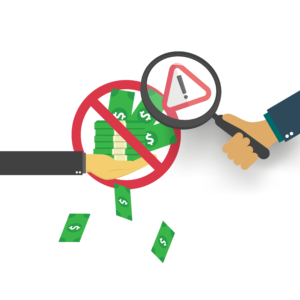August 6, 2020
Categories: Education & Security
What the Latest Scams Look Like and How You Can Protect Yourself
Scammers are quite good at what they do: exploiting people’s vulnerability and trust for their own financial gain. Masquerading as government agencies, financial institutions (including The Summit), famous people or even someone you know, scammers trick unsuspecting people into giving up personal information or sending money that they never get back. Moreover, by participating in these scams, victims may find themselves criminally liable. Among the many methods scammers use, these scams relating to unemployment and the coronavirus have recently become prevalent:
Money Mule Scam
In this scam, victims are unknowingly used by scammers to launder stolen money and commit financial fraud. The latest versions of the money mule scam often involve ill-gotten unemployment benefits.
How it works: The scammer applies for unemployment benefits using a stolen identity. The scammer, sometimes posing as a romantic partner or potential employer, then recruits an individual to act as a “mule” (carrier/ launderer) for the money. The victim either deposits the funds into his or her existing account or opens a new account to receive the funds. The victim is then asked to pay the scammer the amount deposited, usually by wiring funds to an overseas account or by sending the money to the scammer as gift cards.
In some cases, the scammer asks the victim for their MICR number (the line of numbers at the bottom of checks). This information is then entered into the unemployment claim as the account to which benefits should be direct-deposited. Sometimes, the scammer appears to be an official government agency that “made a mistake” by depositing the money into a victim’s account. The scammer asks for the victim’s help in getting the money returned to the agency.
The ramifications of participating in money mule scams can be both monetary and legal. Once the funds are removed from the victim’s account, the victim could be responsible to pay back the scammed money to the financial institution. The victim, having now participated in a money-laundering scheme, could also face legal trouble.
Unemployment Phishing Scam
“Phishing” is the act of sending a fraudulent email in order to trick the recipient into giving up personal information. Recent phishing scams include those that target people looking for a job and/or applying for unemployment benefits.
How it works: The victim typically receives an email that appears to be from the U.S. Department of Labor or another official source; sometimes, the email looks to be from a potential employer. In the email, the victim is alerted that his or her unemployment paperwork is incomplete and more information is needed to process the claim. Often, a link takes the victim to a scam site to input personal information such as a social security number or account information. The scammer then accesses the victim’s accounts or uses the victim’s identity to secure credit cards, make purchases, or even take out loans.
Other recent unemployment scams may involve a “processing fee” for employment applications, offers to purchase a “starter kit” for a work-from-home job, or requests for your bank account information in order to deposit your paycheck.

Twitter Cryptocurrency Scam
In this scam, the Twitter account of a famous person, a well-known organization or financial institution is hacked by a scammer who can then tweet from the account.
How it works: In one version of this scam, solicitations for “donations” of cryptocurrency (such as Bitcoin) are tweeted from the hacked accounts, often with the promise to return twice the donated amount back to the victim. A link to a cryptocurrency wallet (much like an electronic bank or credit union account) is provided to the victim, who is asked to pay the amount specified to help in COVID-19 relief or another humanitarian effort.
This scam may also appear as a “double your money” scheme and can be perpetrated on other social media platforms.
Defend Yourself Against Scams
Remember, the best defense against any scam is to always have your guard up. Never give out personal information or send money to anyone you don’t know, be very suspicious of any promise of free money, and always verify the sender of all emails of a personal or financial nature.
Read additional information about avoiding coronavirus scams here.
For more tips on recognizing scams and fraud, visit the Fraud Prevention Center of summitfcu.org.
Cynthia Kolko, The Summit Federal Credit Union
